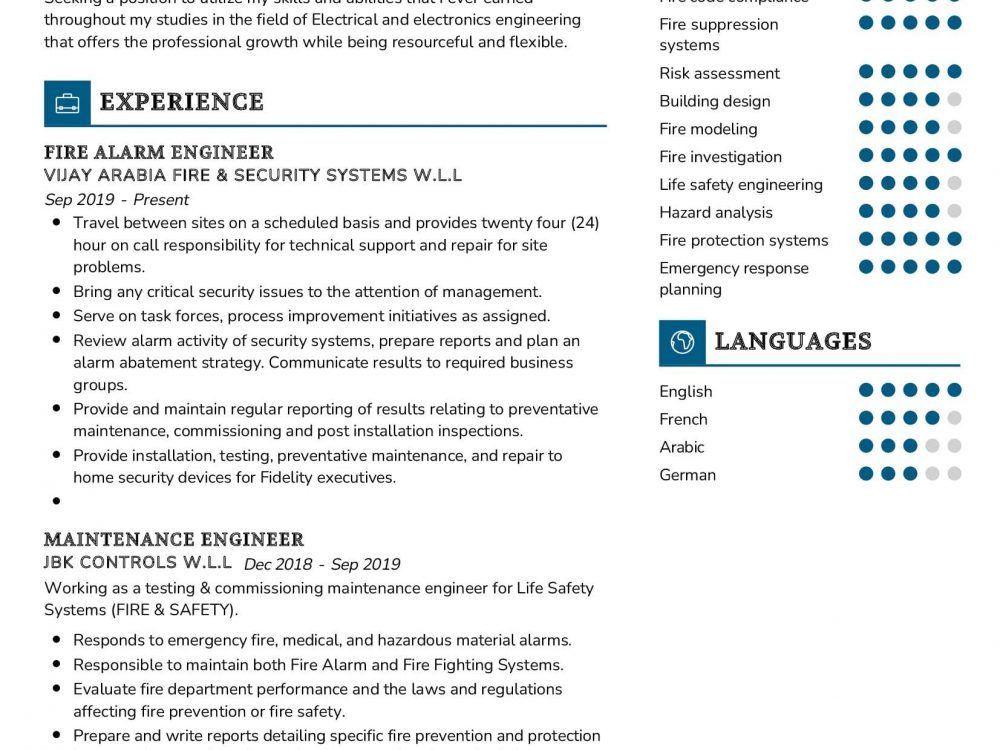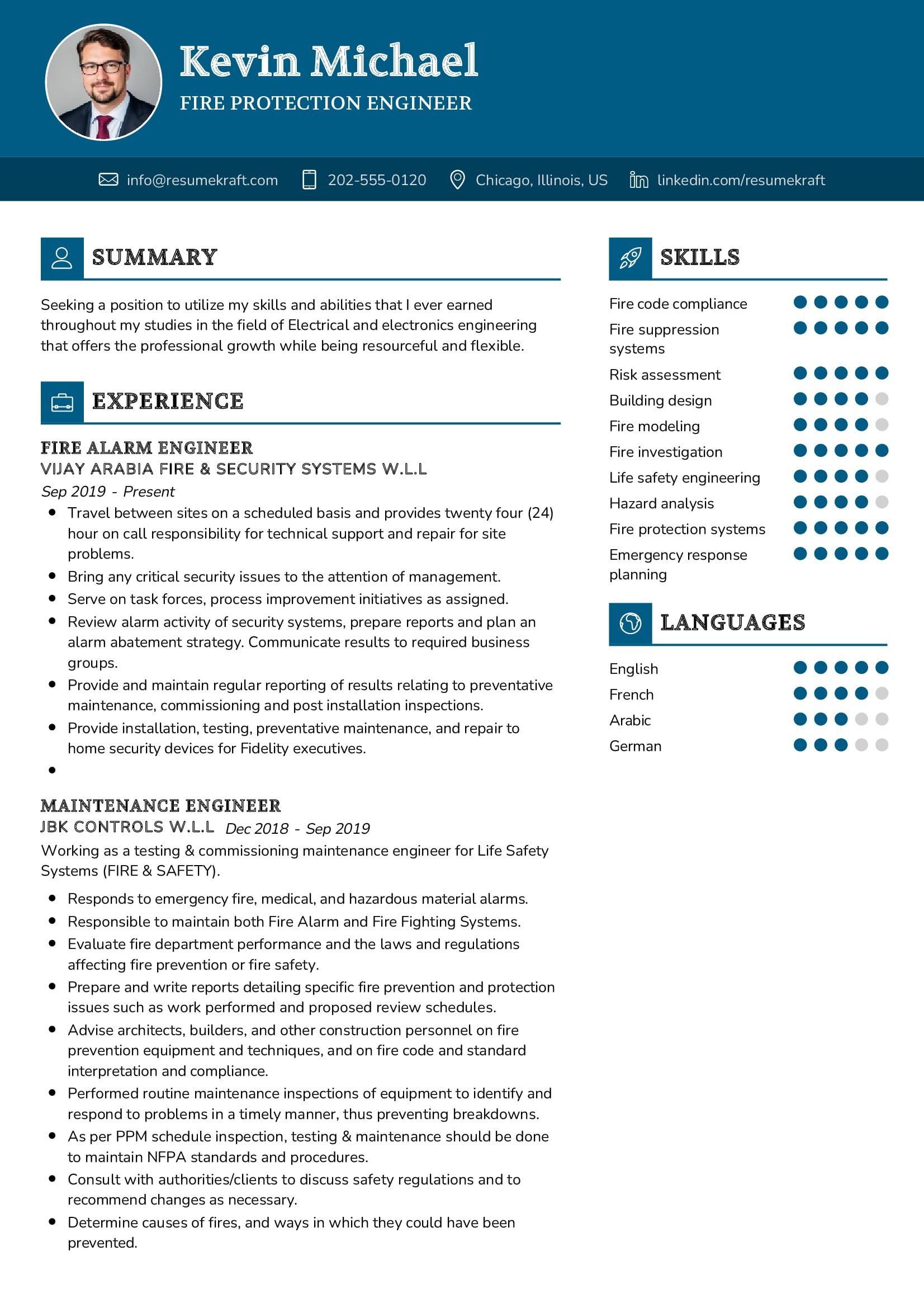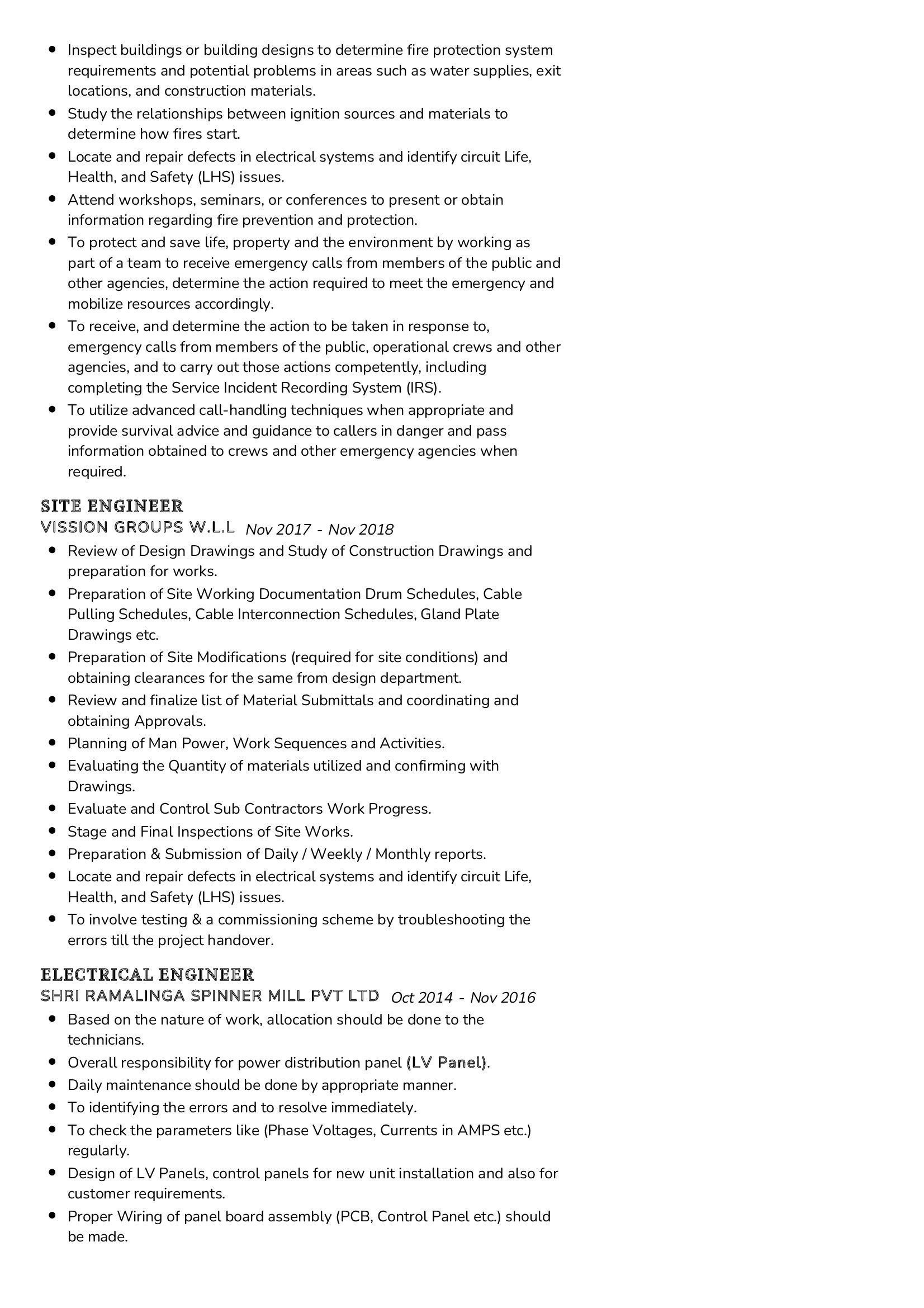What is the Role of a Fire Protection Engineer?
As the importance of fire safety in both residential and commercial spaces continues to grow, the role of a Fire Protection Engineer has become increasingly crucial. This profession blends technical expertise with a deep commitment to safeguarding lives and property from the ravages of fire. In this comprehensive guide, we’ll delve into the multifaceted role of a Fire Protection Engineer, exploring the responsibilities, qualifications, and skills required for success in this rewarding field.
What are the Fire Protection Engineer Job Requirements?
Becoming a Fire Protection Engineer requires meeting a series of stringent requirements and acquiring a specialized skill set. Here are the prerequisites that aspiring Fire Protection Engineers need to fulfill:
- A Bachelor’s or Master’s degree in Fire Protection Engineering or a related field, demonstrating a strong foundation in fire science and engineering principles.
- Profound knowledge of fire dynamics, fire prevention, and fire suppression systems.
- Experience in fire protection system design and analysis, with a track record of successful projects.
- Strong analytical skills to assess fire risks and develop effective fire safety strategies.
- Knowledge of relevant building codes and regulations, ensuring compliance with safety standards.
- Excellent communication skills to collaborate with architects, contractors, and regulatory authorities.
- Proficiency in computer-aided design (CAD) software for creating detailed fire protection plans.
- An understanding of risk assessment and hazard analysis to identify potential fire hazards in various environments.
- Project management skills to oversee the implementation of fire protection measures.
Continuing education and certifications in fire protection engineering are also valuable additions to your qualifications.
What are the Responsibilities of a Fire Protection Engineer?
The role of a Fire Protection Engineer is multifaceted and demands a deep commitment to ensuring fire safety. Here are the core responsibilities that define this role:
- Conducting fire risk assessments for buildings and facilities to identify potential hazards and vulnerabilities.
- Designing fire detection and alarm systems, as well as fire suppression systems, tailored to the specific needs of a project.
- Collaborating with architects and construction teams to integrate fire protection measures seamlessly into building designs.
- Evaluating the effectiveness of existing fire protection systems and recommending improvements or upgrades.
- Reviewing and interpreting building codes and regulations to ensure compliance in all fire protection designs.
- Performing hydraulic calculations to determine water supply requirements for fire sprinkler systems.
- Conducting fire drills and training sessions for building occupants to ensure they know how to respond in case of a fire emergency.
- Collaborating with local authorities and fire departments to obtain necessary permits and approvals.
- Staying up-to-date with advancements in fire protection technology and incorporating innovative solutions into projects.
Each responsibility is a critical element in the comprehensive effort to protect lives and property from the devastating effects of fires.
Fire Protection Engineer Resume Writing Tips
When crafting your Fire Protection Engineer resume, it’s essential to present yourself as a capable and dedicated professional. Here are some tips to help you create a compelling resume:
- Highlight your experience in fire protection system design and implementation, emphasizing successful projects you’ve worked on.
- Include specific examples of fire risk assessments you’ve conducted and the impact of your recommendations.
- Quantify your achievements by using metrics to showcase the effectiveness of your fire protection solutions.
- List any relevant certifications, such as Certified Fire Protection Specialist (CFPS) or Professional Engineer (PE) licensure.
- Customize your resume for each job application, aligning your qualifications with the specific requirements of the position.
Your resume should serve as a testament to your expertise in fire protection engineering and your commitment to fire safety.
Fire Protection Engineer Resume Summary Examples
Your resume summary is the gateway to your career story, offering a glimpse of your experience and qualifications. Here are some examples to inspire you:
- “Experienced Fire Protection Engineer with a strong track record in designing and implementing fire safety solutions for commercial and residential buildings. Committed to ensuring the highest level of fire protection to safeguard lives and property.”
- “Certified Fire Protection Engineer with expertise in fire risk assessment, system design, and regulatory compliance. Skilled in collaborating with cross-functional teams to integrate fire protection seamlessly into architectural designs.”
- “Fire Protection Engineer with a passion for innovation in fire safety technology. Proven ability to enhance existing systems and develop cutting-edge fire protection solutions to meet evolving safety standards.”
Your resume summary should leave a lasting impression, showcasing your unique strengths as a Fire Protection Engineer.
Create a Strong Experience Section for Your Fire Protection Engineer Resume
Your experience section is the heart of your resume, where you narrate your career journey and accomplishments. Here are some examples to guide you:
- “Led the design and implementation of fire detection and suppression systems for a portfolio of commercial properties, resulting in a 30% reduction in fire-related incidents.”
- “Conducted comprehensive fire risk assessments for high-rise residential buildings, identifying critical vulnerabilities and implementing safety measures that reduced potential risks by 40%.”
- “Collaborated with architects and construction teams on major infrastructure projects, ensuring seamless integration of fire protection systems and adherence to all building codes and regulations.”
Each experience should tell a story of your dedication to fire safety and your ability to make a meaningful impact.
Sample Education Section for Your Fire Protection Engineer Resume
Your educational background is the foundation of your career as a Fire Protection Engineer. Here’s how you can present your academic achievements:
- Master of Science in Fire Protection Engineering, XYZ University, a comprehensive program that deepened my understanding of fire safety principles, 2018.
- Bachelor of Science in Mechanical Engineering, ABC University, providing a solid foundation in engineering principles, 2014.
- Certified Fire Protection Specialist (CFPS), a prestigious certification demonstrating expertise in fire protection, 2019.
Your education showcases your commitment to gaining the knowledge and skills necessary for fire protection engineering.
Fire Protection Engineer Skills for Your Resume
Your skill set as a Fire Protection Engineer is your toolkit for ensuring fire safety. Here are the essential skills you should highlight:
Soft Skills:
- Attention to detail to identify potential fire hazards.
- Effective communication to collaborate with diverse teams and convey fire safety information clearly.
- Analytical thinking
to assess fire risks and develop effective solutions.
- Project management skills to oversee fire protection projects from inception to completion.
- Adaptability to stay current with evolving fire safety technology and regulations.
Hard Skills:
- Fire dynamics knowledge to understand how fires behave and spread.
- Proficiency in computer-aided design (CAD) software for creating fire protection plans.
- Expertise in hydraulic calculations to determine water supply requirements for fire sprinkler systems.
- Understanding of building codes and regulations related to fire safety.
- Experience with fire risk assessment and hazard analysis methodologies.
Each skill is a tool in your arsenal, allowing you to excel in the field of fire protection engineering.
Most Common Mistakes to Avoid When Writing a Fire Protection Engineer Resume
When crafting your resume, be mindful of common mistakes that can hinder your chances of securing your desired position. Here are some pitfalls to avoid:
- Avoid using a generic, one-size-fits-all resume. Tailor your resume for each job application to highlight relevant skills and experiences.
- Don’t simply list job duties; showcase your achievements and the impact of your work.
- Include a well-crafted cover letter to complement your resume and convey your passion for fire protection engineering.
- Avoid overwhelming your resume with technical jargon that might not be easily understood by non-technical readers.
- Always proofread your resume to ensure it is error-free and presents a professional image.
Steering clear of these common mistakes will help you create a resume that effectively represents your qualifications and expertise as a Fire Protection Engineer.
Key Takeaways for Your Fire Protection Engineer Resume
As we conclude this comprehensive guide, let’s summarize the key points to remember when crafting your Fire Protection Engineer resume:
- Emphasize your experience in designing and implementing fire protection systems.
- Highlight your expertise in fire risk assessment, regulatory compliance, and innovative fire safety solutions.
- Showcase your certifications and commitment to ongoing professional development.
- Customize your resume for each job application to align with the specific requirements of the position.
Remember, your resume is your professional narrative, telling the story of your dedication to fire safety and your contributions to the field of fire protection engineering.
If you’re ready to create an impressive resume that opens doors to exciting opportunities in fire protection engineering, we invite you to utilize our AI Resume Builder. Our tool will help you design a standout resume tailored to your unique qualifications and experiences. Don’t miss the chance to present yourself as a top-notch Fire Protection Engineer in the job market.



